

 |
 |
A Canoe Voyage up the Minnay Sotorby George William Featherstonhaugh 1835 |
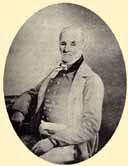 |
|
On the morning of the 22nd I rose with the break of day, and arranged everything for my departure. It appeared to me as if it would be impossible to stow away in such a small vessel the immense quantity of things I had from time to time purchased. I had been told that I should find my crew voracious eaters, and having had before some experience of men of their class, had provided accordingly. I had purchased a barrel of pork, two barrels of biscuit, two large bags containing hams, two containing potatoes, one bag of flour, boxes with rice, sugar, candles, tobacco, axes, powder and shot, and a variety of other articles, consisting of pots, kettles, frying-pans, tin-ware, plates, knives and forks, &c. In addition to all these necessary articles, were the tent, my luggage, and a case of books, and a small service fitted for my own use for breakfast and dinner. As the hour approached for the canoe to arrive, I became very much concerned which of these multifarious objects I should determine to leave behind, for it appeared to me impossible to take them all. When Beau Pré made his appearance I communicated my fears to him, and was glad to find he did not enter into them. "Le porc, Bourgeois," said he, "se mangera bien vite; ces gaillards là n'en ont pas gouté depuis longtems: et pour les biscuits, ne craignez rien. Vous verrez comme les patates disparaitront; on ne s'arretera pas à les compter, j'en reponds." A little after seven the men all made their appearance, and to my great surprise they did manage to stow every thing away in the boat, so that we were not obliged to leave anything behind. They contrived, too, to arrange plenty of room for the bourgeois in front of the steersman; so that I could either sit with my back to the trunks, that were covered with a large bear-skin I had purchased, or recline on a sort of sofa made of blankets. My books and portfolio were near me, and a commodious and handy place for my compass, telescope, and gun. When the last man stepped into the canoe, the water was within a few inches of the gunwale, and everything being ready, we pushed off from the bank amidst the salutations and good wishes of our friends; and my men, striking into a Canadian barcarole and chorus, plied their paddles lustily up the Fox River. In half an hour I had got accustomed to my situation, and was perfectly delighted at commencing my adventures under such promising circumstances. The Fox River is about 1500 feet wide, with gentle sloping banks, which became higher as we advanced. Coming to a rapid, we all got out to lighten the canoe, the men walking in the water and conducting it by their hands through the most rocky parts. ... At fifteen miles from Navarino we came to a still more severe rapid, and again had to lighten the canoe. At the head of the rapid we met some officers of the United States army, with a party of men, making a military road. At 12 P.M. I made the signal, and the canoe was paddled to a convenient place on the shore for the men to cook their dinner. They soon had their pot of pork and potatos placed on a good fire, and leaving them to enjoy their meal, I wandered about in search of plants and land shells. On my return, an hour afterwards, I found them all enjoying their pipes and chattering away at a great rate; and proceeding to the canoe they all followed me, and having stowed away their batterie de cuisine, we again started. |
 |
|
As we advanced the river widened, and the country became strikingly beautiful, the banks, with fine trees here and there interspersed, sloping gracefully down on each side, as if the river was gliding through an amphitheatre. Further on the amenity of these slopes became strongly contrasted with the foaming of the most formidable of all the rapids on this river, called in the Menomminie tongue Kawkawnin, literally "can't get up." The rocks here are in such amazing numbers, and are so piled up, and the rapid is so strong, the fall being equal to about twenty feet per mile, that it is impossible to get canoes up it. The Canadian voyageurs, who ruin every Indian word they meet with, have called this place, whose Indian name is so significant, Cocolo, by which name it is universally known amongst them. Here, then, we stopped at the eastern end of the portage, it being necessary to unload the canoe and carry it and all our lading to the other end of the portage. ... The portage lay over a rich black soil lying on the horizontal limestone extending over this part of the country; and taking my gun and portfolio, I left Beau Pré in charge of everything, and directed him to watch the Indians whom he should employ to carry the butin across very closely, for I had always found in my travels that good luck and good lookout were very intimately connected together. This word butin, seems to be a remnant of buccaneering times, and to have been applied to luggage and personal property of every sort from the time of the first French flibustiers or freebooters, and to have come from the Gulf of Mexico, up the Missisippi, the Ohio, and all the great water communications, for the Kentuckians and generally the Americans in the southern parts of the Republic have literally translated the word into plunder. I well remember my extreme astonishment, the first time I was asked by a stage driver, in one of the Southern states, "How much plunder have you got, mister?" as though my luggage had been stolen from some other person. ... |
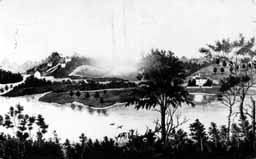 Kawkauna |
|
... As soon as we had got our butin and canoe to a dry clean place at the west end of the portage, I had my comfortable tent pitched, all our lading placed inside, and a good fire made in front of the entrance. The next thing was to prepare my dinner, and having appointed one of the Canadians my cook, I stood over him at the fire, to see that he attended to his duty in a proper and cleanly manner. My dinner consisted of fried ham and slices of boiled potatos fried along with it, and browned in the most satisfactory and savoury manner. To this I added excellent black tea, bread and butter, and some milk from a bottle with which I had provided myself, and I certainly never made a more hearty meal upon any occasion. After a good deal of experience in travelling in Indian countries, I find that, with system, you can lay the foundation for a great deal of comfort, quite as much as that mode of life admits of. My rule always is, to make a hearty breakfast after travelling ten or fifteen miles, stopping at the most eligible place for that purpose, where wood and water and shade--if it is wanted--unite in inviting you. The moment breakfast is over, all re-embark, since that is not the time of day for commerage. The bourgeois is the supreme head; the men look upon his word as their law; they obey his orders, and never question his reasons. If he wishes to go ashore, he informs the man behind him who steers; and when he requires them to wait for him at the place where he lands, they know that their business is to wait as long as their provisions last; for they have nothing to do but eat and drink, and obey him, and have not the least objection to pass a few days at any one place in idleness. About three-quarters of an hour before night, on the order being given to land and encamp, as soon as the canoe reaches the shore, two of the men, selected for that duty, take out the tent and pitch it: the steersman's business is to see that everything is taken out of the canoe, and placed under the tent. Last of all, the canoe is taken out of the water, placed on its edge on a level piece of ground, and, being supported by poles, forms a canopy for the men to sleep under. Then comes the important business of preparing the bourgeois' dinner (I never eat but twice in the day) and their own. As soon as his tent is pitched, the two men whose duty it is to attend it cover the ground within with tender branches of the spruce fir tree, putting a double quantity where he is to sleep, over which is placed an oil-skin, and a bear-skin over that, with a blanket or two for covering. The rest collect fire-wood, and build immense fires--one before the bourgeois' tent, and the other before their own quarters, which they replenish during the night if it is cold. Nothing can be more agreeable than this sort of life, if the people behave well; and when they do not, the best way is to be firm, and even arbitrary, especially with Canadians. Kindness, however, is not thrown away upon them, and very long journeys may be prosperously made with their assistance, by the aid of a little quiet management, encouraging them to sing, and joining with them in their choruses. ... Fat salt pork is their delight: they do not get it when at home, where vegetables form their principal diet; and they like it so much, that they absolutely appear unhappy when they can eat no more. After stuffing to the greatest extent, they cover their heads and every part of their bodies with their blankets, and lie down with their feet to the fire, snoring away, as I have often seen them, with the rain pouring down upon them, and the steam reeking from their bodies. This night, as soon as my evening's repast was over, I made the entrance to my tent fast, and, with my stores and luggage around me, lay down to sleep. ... I rose at daybreak, and after making my toilette, went to an eminence, a little north-west from my camp, from whence I had a fine view of the river and surrounding country. It divides here, and forms a channel on each side of an island, which is almost round. ... |
|
|
... Finding there were more rapids ahead, I proceeded on foot by the bank of the river, after seeing the men off with the canoe, and walked in the long grass about six miles; but I was so thoroughly wet with the heavy dew upon it, that, after gaining the head of the rapid, I collected some wood and made a fire, which I found very comfortable, and had time to dry myself before the canoe came up, which was about 10 A.M. We breakfasted at this place; and feeling myself perfectly refreshed, I walked to some Winnebago huts, where there was a flag flying, built upon a hill, at no great distance: they were six in number, and one of them was twenty-four feet long. This was a settlement of Indians, that had been formed by the Canadian priests, and professed the Roman Catholic religion. It was a flag of the United States which was flying, with a cross in the centre. There was abundance of corn and pumpkins in the wigwams. ... How they got the name of Winnebagoes I know not--they do not know the word. It seems to resemble Winnipec, the name of the lake into which Red River flows; but whether derived from it or not, it is certain that it has been given to them by others, and is another instance of the folly of distinguishing the Indian tribes by any but national names. Every one of them that I conversed with stated the name of the nation to be Howchungerah, from howrah, fish, and wungerah, man; they being a fish-eating tribe of the great Nacotah nation, further to the west, a dialect of whose tongue they speak, and having separated from whom, they settled in a lake country abounding in fish, which thus became their principal diet. ... |
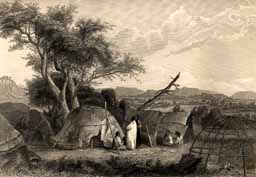 Winnebago Wigwams |
|
... From this village we had good paddling water for three miles, when I got out of the canoe again, and walked a mile and a half to La grande Chûte, a fall, where the river comes over a ledge of limestone rocks six feet high. Above this the stream became exceedingly beautiful; the banks of the river presenting on each side broad and gentle slopes; the trees growing park-like, and the wild grass being very high. Nothing could exceed the fertility of the soil, which is a black vegetable mould upon a deep red loam. At a place called La petite Butte des Morts the river widened into a small lake. Here Mr. Whitney told me he had an agent, a Mr. Cottrell, to whom he had requested me to deliver a message: accordingly I left the canoe, and walked through the forest to his house. On approaching it, I perceived several Canadians and Indians in and about it most uproariously drunk, and very much disposed to be too familiar with me--some of them trying to take my gun away. After a long attempt to get an interview with Mr. Cottrell, he at length made his appearance, but intoxicated in so beastly a manner, that I was excessively disgusted. At first he insisted upon my stopping with him and "taking a drink," as he called it; but when he heard me say, that, "being a friend of Mr. Whitney's, I had promised to call and see how he was going on," he seemed quite as anxious to get rid of me. |
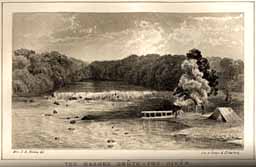 La Grande Chute |
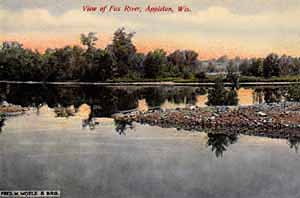 Fox River |
|
|
I now hastened back to the canoe, lest these drunken fellows should get into communication with my own people, but I was too late; they had found them out, and were already pulling them ashore, to carry them off to the house to drink. I saw at once that my men desired nothing better, and that, if I permitted it, I should lose all command over them; so, entering the canoe, I ordered them to come on board, and said that I would leave every man behind who did not immediately obey me. Beau Pré behaved very well upon the occasion, and seconded me: all but L'Amirant sulkily got into the canoe, and I pushed off into the stream. Seeing that I was in earnest, L'Amirant, knowing that we should soon be out of sight, left his drunken companions, and taking a short cut through the woods, came to the water-side to get on board. I directed Beau Pré to steer the canoe sufficiently near to the shore to speak to him, and told him I did not want a fellow that preferred being drunk ashore to doing his duty with his comrades; that I knew Cottrell would not dare to keep him there, but would turn him out of doors; and that when he got back to Navarino, Mr. Whitney would put him in prison for breaking his engagement. He now was very much frightened, and began to entreat me in the most piteous manner to take him on board; and Beau Pré and the men uniting with him, I consented as a matter of favour to them, though I was quite as anxious to have him back as he was to come, for he was a resolute bon enfant, and drinking was his only fault. I therefore took him on board, satisfied with the opportunity the incident had given me of convincing them that I was determined to be obeyed. We now proceeded a mile and a half further to the foot of Lake Winnebago, a very extensive sheet of water, running north and south; and the day drawing to a close, I thought it not advisable to enter upon the navigation of the lake until morning: we accordingly made for a rich prairie flat on the right bank of the lake, where there were a few Indian wigwams, and there I directed the tent to be pitched. ... |
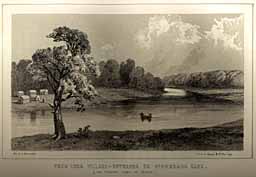 Four Legs Village-entrance to Lake Winnebago |